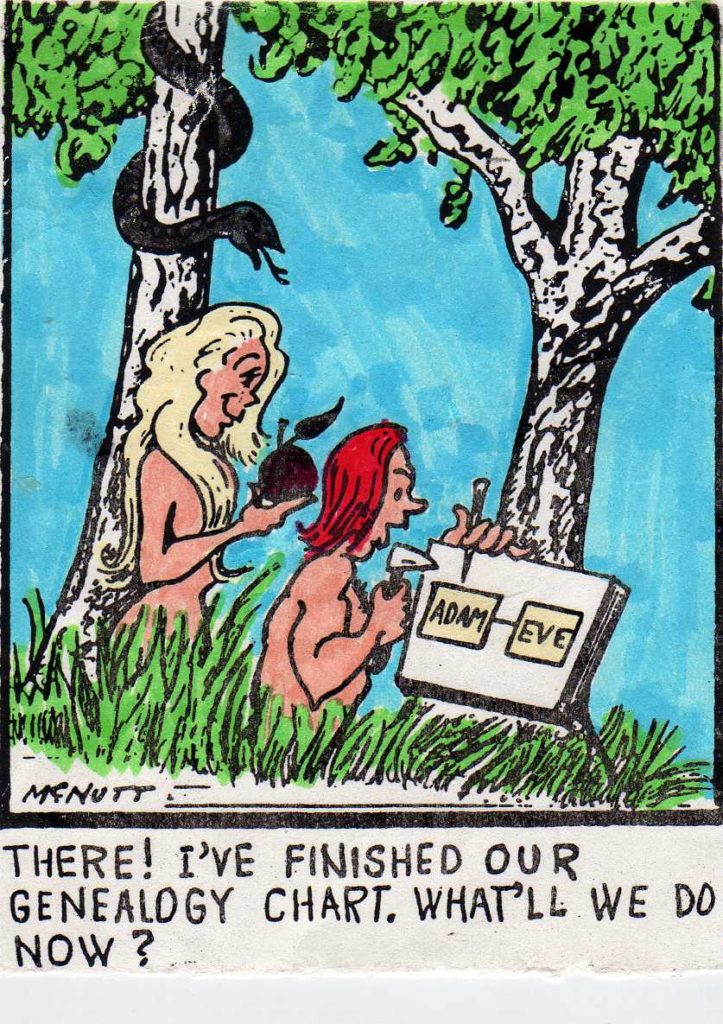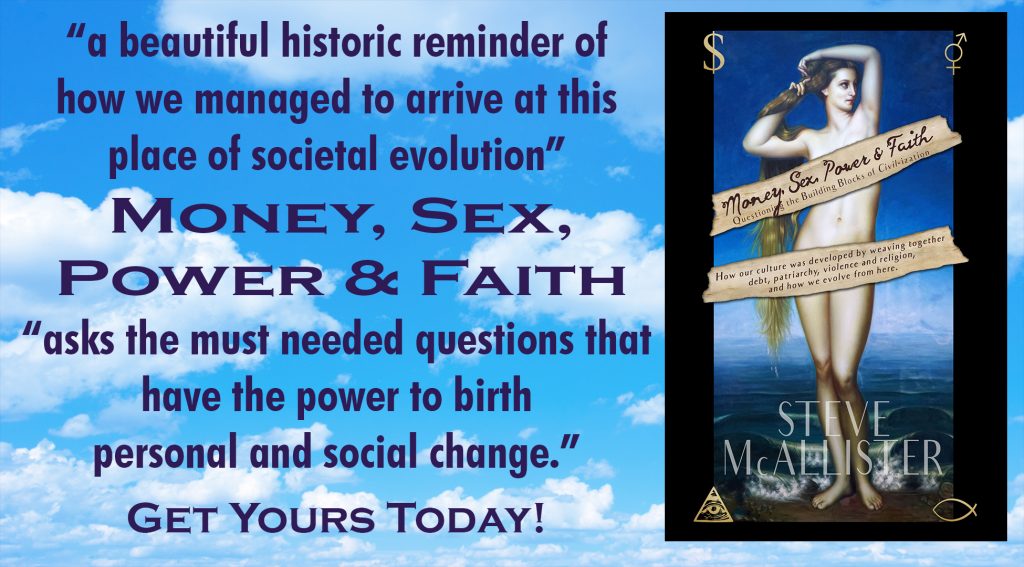The following is a chapter from Money, Sex, Power & Faith.
Order your copy in paperback or for Kindle!
“When it is understood that one loses joy and happiness in the attempt to possess them, the essence of natural farming will be realized. The ultimate goal of farming is not the growing of crops, but the cultivation and perfection of human beings.” – Masanobu Fukuoka, The One-Straw Revolution
As the Judeo/Christian story goes, what we consider “prehistory” is a myth. According to Archbishop James Ussher, who served the Church of Ireland from 1625-1656, genealogical records from the names and dates in the Bible prove that God created the Earth on Sunday, October 23, 4004 BC. Over the next several years, as the story goes, Adam and Eve managed to get kicked out of the gated community of Paradise, learned how to farm, and trained up their offspring to work the soil by the sweat of their brow while eating whatever they could grow or kill, and somehow finding a way to populate the Earth.
 By the time they were adults, Adam and Eve’s two sons, Cain and Abel, had already mastered the practice of agriculture, with Cain focusing on horticulture and Abel focusing on livestock. Apparently, God preferred the taste of Abel’s mutton over Cain’s veggies, and in the first case of jealous rage, Cain killed his brother, the butcher. As Cain goes forth to populate the Earth by himself, he must have shared the idea of agriculture with the other people who somehow actually existed, and the idea of agriculture eventually took hold around the world.
By the time they were adults, Adam and Eve’s two sons, Cain and Abel, had already mastered the practice of agriculture, with Cain focusing on horticulture and Abel focusing on livestock. Apparently, God preferred the taste of Abel’s mutton over Cain’s veggies, and in the first case of jealous rage, Cain killed his brother, the butcher. As Cain goes forth to populate the Earth by himself, he must have shared the idea of agriculture with the other people who somehow actually existed, and the idea of agriculture eventually took hold around the world.
Although the particulars of the biblical account leave many scratching their heads with more questions than answers, looking beyond the literal, it is still the account of how agriculture was integrated into our lifestyles and separated us from the less complicated life of unity we once enjoyed. If you stretch the Creation story out so the second chapter of Genesis actually takes 200,000 years, and change the roles a bit (since Eve could very well have gotten here first), it does kinda resemble what anthropologists now know actually happened… except for the talking snake part.
In actuality, there is reason to believe women started the agricultural revolution. As Riane Eisler writes in The Chalice and the Blade, “It is also more than likely that women invented that most fundamental of all material technologies, without which civilization could not have evolved: the domestication of plants and animals. In fact, even though this is hardly ever mentioned in the books and classes where we learn history of ‘ancient man’, most scholars today agree that this is probably how it was. They note that in contemporary gatherer-hunter societies, women, not men, are typically in charge of processing food. It would thus have been more likely that it was women who first dropped seeds on the ground of their encampments, and also began to tame young animals by feeding and caring for them as they did for their own young. Anthropologists also point to the fact that in the primarily horticultural economies of ‘developing’ tribes and nations, contrary to Western assumptions, the cultivation of the soil is to this day primarily in the hands of women.”
Agriculture may just be what the “fruit of the knowledge of good and evil” was meant to represent, but as it was eventually written into the Judeo/Christian rulebook as the natural manifestation of the way things should be, recent scholars like Jared Diamond suggest agriculture may have been “the worst mistake that humanity has ever made.” Citing the number of additional hours that must be worked to cultivate food rather than the few it took to hunt and forage for it, combined with the number of diseases that arose from living in such close proximity to the animals during domestication, and the immuno-deficiencies and defects which arose from adapting to a sedentary lifestyle, Diamond argues that agriculture didn’t create the lifestyle improvement we have come to call progress, but actually stripped humanity of a much more abundant and leisurely livelihood.
However, it is not necessarily agriculture in itself that created the problem. After all, in its simplest definition, agriculture is merely cultivating the food you like to eat. Chances are good that humans had realized a healthy symbiosis with Nature and did what they could to help the plants they enjoyed to prosper so they could enjoy the benefits. Where our path went awry is in instituting what Daniel Quinn coined “totalitarian agriculture.”
In introducing totalitarian agriculture, homo sapiens, spurred on by new religious traditions that put them at the center of the Universe, started embracing the idea that the world and everything in it was here primarily for the enjoyment of homo sapiens. This being the case, we took agriculture to a new level, not only helping the plants we enjoyed to prosper, but also to make it unavailable to other species, destroying those that would share in our bounty, and using our newly realized ideas on property to devote swaths of land to make food exclusively for humans.
“We also figured out that we could replace inedible forests with edible crops,” wrote Thom Hartmann in The Last Hours of Ancient Sunlight. “Instead of having a plot of land produce only enough food to feed ten people, that same land could now be worked to feed a hundred. The beginning of agriculture is referred to as the Agricultural Revolution, and it began to gather momentum about 10,000 years ago. Because we had discovered and begun to use these two methods (herding and agriculture) to more efficiently convert the sun’s energy into human food, our food supply grew. Following the basic laws of Nature, because there was more food, there could be more humans, and the human population started growing faster.”
Of course, as we began the battle with Nature and forced Her to be subjected to the hierarchy we were creating, with us at the top, we also started creating hierarchies amongst ourselves. Just as homo sapiens was the species to rightfully sit at the top of the world’s food pyramid, some among the species realized a developing hierarchy within the top tier itself. Those who were crafty enough to convince others that the land which produced the bounty belonged to them were able to harness the energy of other people just as the species was doing with the rest of the natural world.
As Jean-Jacques Rousseau put it in Discourse on Inequality, “The first man who, having fenced in a piece of land, said ‘This is mine,’ and found people naïve enough to believe him, that man was the true founder of civil society.”
Order your copy of Money, Sex, Power & Faith today!


